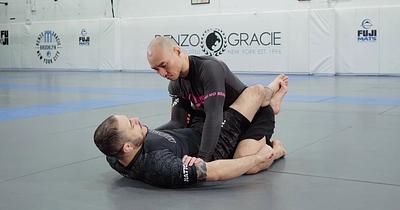BJJ’s Unofficial Historian: How One Man Built the Sport’s Archive
by Shawn Aukstakalnis
Updated: January 28, 2025

BJJ’s Missing Record Book
Unlike mainstream sports, BJJ lacks an official archive for competition results. Older matches, especially from the 90s and early 2000s, were never systematically recorded online. Without dedicated historians, many legendary performances would have been lost.
How BJJ Heroes Became the Sport’s Archive
André Borges, a black belt since 2011 and lifelong BJJ fan, took it upon himself to document the sport’s history. He started BJJ Heroes in 2010 after realizing that many grapplers—even experienced ones—had little knowledge of key figures like Tererê and Nino Schembri. What began as a small project quickly grew into a high-demand resource, forcing him to upgrade servers multiple times due to traffic spikes.
Unlike many who rely on existing online records, André built his database from print magazines, firsthand interviews, VHS tapes, and DVDs—painstakingly preserving details from old Worlds, Pans, and IBJJF events. Some results, like those from Leandro Lo’s early career, were so deeply buried that André still remembers the exact page of the GracieMag article he pulled them from.
“I even went to the Brazilian eBay version and bought as many older Tatamis and GracieMags to have the most records possible.”
His dedication went beyond compiling data—he actively tracked down fighters’ personal stories and cross-referenced obscure sources to ensure accuracy. Without this effort, much of BJJ’s history would have been lost.

Why This Work Matters
When BJJ Heroes launched 15 years ago, grappling media barely existed online—most coverage was still in print through magazines like GracieMag and Tatame. No-Gi was a niche, social media was in its infancy, and professional grappling events were a rarity. Since then, the sport has grown immensely, but through all that change, BJJ Heroes has remained a cornerstone for historical records and athlete profiles.
André’s work didn’t just help BJJ Heroes—it became the backbone of modern BJJ knowledge. Many sites and databases today unknowingly rely on his research, whether directly or through second-hand sources. For many older events, BJJ Heroes remains the primary source of truth on the internet, even as its data is repeated across spreadsheets and websites.
This is true even for Digitsu’s BJJ database, which compiles data from what appear to be official sources—yet, as is often the case with historical records, many of these may ultimately trace back to André’s original work. Without his efforts, entire competition histories would be incomplete.
For anyone looking up past matches, fighter records, or just exploring BJJ history, especially historical records, BJJ Heroes remains the gold standard.
You can follow André’s work on BJJ Heroes and his Instagram (@andre_bjjheroes) for updates.
“Being a JJ nerd from early on has its advantages.”
🔗 Check out BJJ Heroes’ page on Leandro Lo, one of the athletes André personally researched from print sources.
For years, BJJ Heroes has documented the sport’s legends—but in doing so, André Borges became one himself. His dedication to preserving grappling history has shaped how we understand the sport today, making him, in every sense, a true BJJ hero.


